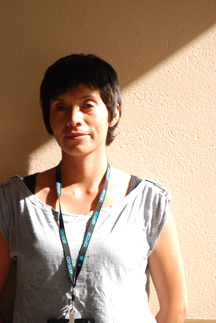WELCOME TO THE ARCHIVE (1994-2014) OF THE MAQUILA SOLIDARITY NETWORK. For current information on our ongoing work on the living wage, women's labour rights, freedom of association, corporate accountability and Bangladesh fire and safety, please visit our new website, launched in October, 2015: www.maquilasolidarity.org
August 31, 2010
 In June 2010, Blanca Velasquez, the Director of the Worker Support Centre in Puebla (CAT, for its Spanish acronym) was in Toronto for a conference on "Building Solidarity with the Democratic Labour Movement in Mexico" organized by Canadian unions and international federations. Blanca spoke about the organizing efforts at auto parts factories in Puebla owned by Johnson Controls. After the meeting, Blanca responded to questions from the MSN team.
In June 2010, Blanca Velasquez, the Director of the Worker Support Centre in Puebla (CAT, for its Spanish acronym) was in Toronto for a conference on "Building Solidarity with the Democratic Labour Movement in Mexico" organized by Canadian unions and international federations. Blanca spoke about the organizing efforts at auto parts factories in Puebla owned by Johnson Controls. After the meeting, Blanca responded to questions from the MSN team.
How did you become involved in the labour rights movement?
In 1999, I started working at Siemens, a German auto-parts manufacturer and a supplier to Volkswagen, which has a plant in Puebla. I was involved in a struggle in which we were able to get our independent union recognized. That set an important precedent because it was the first independent union in the auto-parts industry in the country, and I was its first woman leader. That experience defined me as a labour leader. I knew I had to go on with this work.
And how did the CAT come to be?
A short time later, I was invited by the AFL-CIO Solidarity Center to do part-time research into the garment maquilas in the area. A Solidarity Center organizer and I became involved in what later became known as the Kukdong campaign, which was women-led. After an eight month struggle, the Kukdong workers were able to win an independent union at the factory, an important milestone for the maquila garment sector.
The Kugdong victory allowed us to dream. We wanted a space where workers could come together to receive support and share their struggles. On May 9, 2001, the Worker Support Centre was formed. In 2011 we'll be celebrating our tenth anniversary.
What work is CAT currently involved in?
Just this May, we had an important victory for labour rights in Puebla at the Johnson Controls Interiores plant. Workers went on strike for three days and won a signed agreement in which management recognized their right to be represented by the union of their choice. The agreement also provided workers a substantial profit-sharing increase, and committed management to hire workers directly that had been contracted through a third-party employment agency.
But the struggle is not over. A new collective bargaining agreement still needs to be negotiated, which will - hopefully - include a clause guaranteeing fair representation of women on the executive committee, given that the majority of employees are women.
What has it meant for you to be a women leader in the labour movement?
It's definitely very difficult for a woman to fit into the machista structures of the union world, especially in decision-making positions. For me personally it's been hard, because I try to bring about changes that will benefit everyone, and though I'm strong, I've had to face many difficult times.
One thing I'm sure about: it's no longer sufficient to just ask for training for women. Women must occupy the leadership positions which have been traditionally held by men.
We've seen that despite their double and triple work days, women have been at the forefront of many labour struggles and have shown great courage. But we need more.
Part of the work of the CAT focuses on women's empowerment. I find that even when women want to participate, it's difficult if not impossible for them to do so, given their heavy workloads and pressure they face in the home and with their children. They also often have psychological issues that impede their participation, such as low self esteem.
That is why women's empowerment is so important. For women to become effective organizers, they need to go through a learning process in order to realize that they are capable of much more than just cooking and taking care of their kids. That's when they can then lead and motivate other women to become organizers.